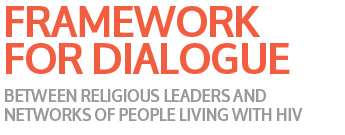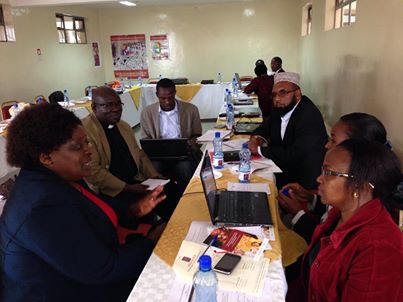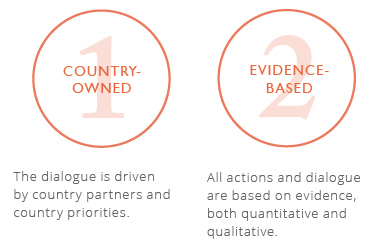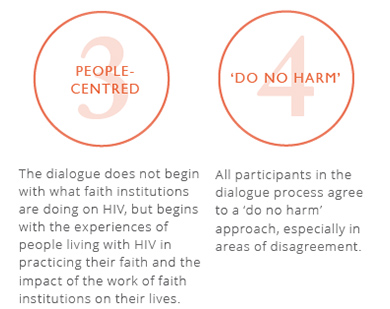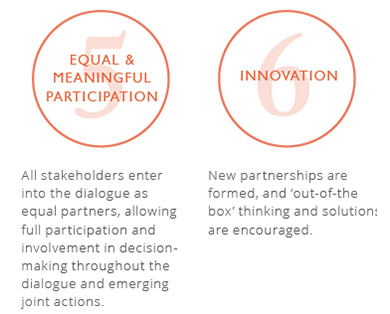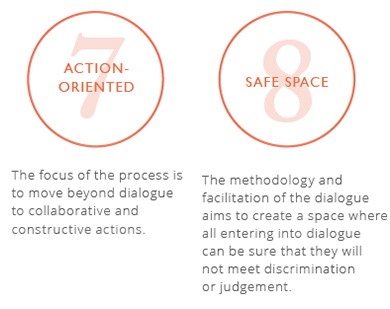Multi-country sharing meeting, 2013
In Nairobi, in December 2013, 23 religious leaders and people living with HIV involved in the dialogue processes in Malawi, Ethiopia, and Uganda were joined by Kenyan stakeholders to reflect on and share their experiences of the Framework for Dialogue process so far. The meeting also aimed to:
- identify commonalities as well as differences from each process;
- facilitate mutual consideration of how to build on the successes to date;
- provide an opportunity for participants from Malawi, Ethiopia and Uganda to articulate tips and advice for others planning to implement the Framework;
The regional sharing was hosted by the Kenya Network of Religious Leaders Living With Or Personally Affected by HIV (KENERELA+) and Ecumenical Advocacy Alliance (EAA).
Key outcomes:
During the meeting, experiences between the countries were shared with enthusiasm. The participants felt a strong sense of support; many expressed how in their own countries it was easy to feel as if they were the only people working on stigma and discrimination. Successes and results were discussed which included:
- A sermon guide for the Orthodox Church on PMTCT, gender-based violence and stigma available in Amharic and English developed in Ethiopia to train Orthodox leaders
- A standardized HIV workplace policy for faith based institutions developed in Malawi followed by an orientation meeting on the policy
- A focus on critical (“sticky”) issues during the Uganda dialogue and so seven priority areas for further dialogue and joint action identified
The group also reflected on the emerging challenges faced in the implementation of the Framework for Dialogue in each country such as how to engage senior leaders’ participation, how to raise difficult issues during dialogue, how to develop achievable work plans, etc. and ways of overcoming them. The need of developing a monitoring and evaluation tool with the help of a facilitator appropriate for measuring and reporting on the outcomes of the processes was agreed as well as supporting the communication of achievements. As a result, on-going work is currently being undertaken to follow up and build on these outcomes.
National Dialogue Process 2014-2015
Interest and agreement to begin the Framework for Dialogue process in the country began in November 2013, with the report on the national implementation of the stigma index available in late summer 2014. Three regional pilot dialogues were held in October and November involving over 110 religious leaders and 50 people living with HIV.
The planning meeting for the national dialogue was held in December, with the dialogue meeting itself held in February 2015. Participants in the planning meeting included representatives of KENERELA+, NEPHAK, and KENWA, as well as religious leaders, representatives of faith-based organizations including the National Council of Churches of Kenya, AIDS Health Foundation (AHF) and government (NACC).
National Dialogue Meeting, February 2015
The meeting brought together 68 religious leaders and people living with HIV to understanding the levels of HIV-related stigma in Kenya and develop strategies to address stigma among the faith congregations and the community.
The dialogue prioritised issues for immediate action and further dialogue for all the stakeholders:
Priorities for immediate action:
1. Involvement of men in HIV services and activities
2. Advocacy for HIV funding from the government
3. HIV messaging: Reviving HIV information, sensitization on HIV for religious leaders to understand the new prevention models. These include: a. Development of Age appropriate sexuality education curriculum; b. Development of standard/common messages across board; c. Development of Stigma free messages; d. Empowerment on HIV counseling and skills
Issues for Further Dialogue:
1. Faith healing
2. Empowerment of religious leaders on HIV
3. Sexual reproductive health (HIV prevention, adolescent and gender related issues etc.)
